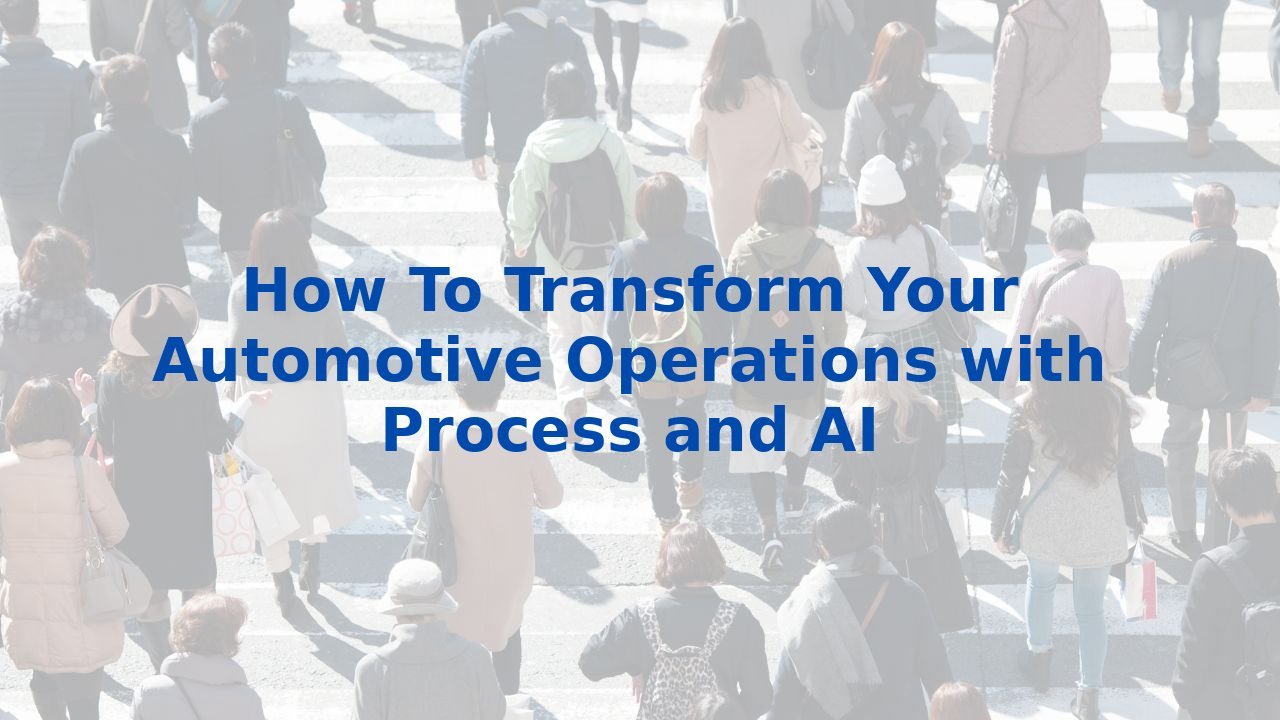How To Transform Your Automotive Operations with Process and AI
Transforming Automotive Operations through a Process Approach and AI
In today’s rapidly evolving automotive landscape, a robust process-oriented approach has emerged as a game-changer. By streamlining workflows and eliminating waste, companies can enhance efficiency and drive responsiveness to market demands. Just as the National Science Foundation has pointed out, adopting this approach can considerably transform automotive operations, ensuring that each step in production adds true value. But how can artificial intelligence (AI) take these insights to the next level?
The Essence of a Process-Oriented Approach
A process-oriented approach focuses on understanding and refining the diverse workflows involved in automotive production. Instead of sporadic changes based on immediate problems, organizations that embrace this method analyze the entire production cycle to identify bottlenecks and inefficiencies. This systematic analysis leads to:
- Increased Efficiency: Each step in the workflow is scrutinized to eliminate redundant tasks, ultimately speeding up the production cycle.
- Higher Quality Products: With streamlined processes, there’s less room for error, leading to the production of vehicles that meet stringent quality standards.
- Cost Reduction: Simplifying workflows often results in lower operational costs, allowing for more competitive pricing.
The Role of AI in Enhancing Business Processes
As organizations strive to implement a more efficient, process-driven approach, AI emerges as an invaluable ally. Here’s how AI can enhance automotive operations:
Data-Driven Decision Making: AI can analyze vast amounts of data far more swiftly than humans. This ability allows automotive companies to make informed decisions based on real-time insights, thus enhancing operational efficiency.
A notable example is predictive maintenance, where AI analyzes data from various sensors throughout manufacturing equipment. Identifying potential issues before they arise helps avoid costly downtimes.
Automation of Routine Tasks: By automating repetitive tasks, AI frees up valuable human resources. Employees can focus their efforts on more complex issues, ultimately driving innovation.
This could involve utilizing robots for assembly lines that adhere to process improvements, thereby enhancing precision while allowing human workers to invest their expertise in problem-solving and creative strategies.
Enhancing Skills: Training Employees for the AI Era
Integrating AI into automotive processes does not only focus on technology; it also heavily emphasizes the necessity of equipping employees with the relevant skills. As AI technologies become more pervasive, training becomes crucial for maximizing their benefits. Organizations that invest in AI training for their workforce can expect:
- Increased Employee Engagement: Equipping team members with AI skills fosters a sense of ownership and engagement. Employees become proactive contributors to innovation, utilizing AI tools to enhance efficiency in their roles.
- Better Adaptability: A well-trained workforce can easily adapt to and thrive in changing environments, leveraging AI to meet the demands of the modern automotive industry.
- Competitive Advantage: Companies that prioritize AI training position themselves as leaders in the automotive sector, armed with the advanced capabilities to outpace competitors.
Conclusion: The Future of Automotive Operations
The convergence of a process-oriented approach and artificial intelligence is not just a trend; it's a vital evolution in automotive operations. By taking a comprehensive look at workflows and embracing technology, organizations can drive enhanced productivity, quality, and cost-effectiveness. AI serves as a catalyst, enriching the process framework and offering unprecedented opportunities for growth and innovation.
As we look to the future, the automotive industry stands on the brink of an exciting transformation. With the right mindset and resources—including a commitment to employee training—organizations can navigate this landscape, reaping the rewards of efficiency and excellence.
To delve deeper into how you can equip your workforce with the necessary AI skills, consider exploring various training opportunities tailored for your organization. Embrace the change, and prepare for a future where process and technology converge to create stellar vehicles that meet tomorrow's demands.



